#the whole scene is so grim and heartbreaking it's almost realistic
Explore tagged Tumblr posts
Text





peaky blinders — 5x01 'black tuesday' created by steven knight
#the fact this moment was used for millions of memes but goddamn if the cinematography wasn't cinematographing#the whole scene is so grim and heartbreaking it's almost realistic#cillian murphy the actor that you are#tommy shelby#peaky blinders#cillian murphy#steven knight#period dramas#tv shows#pb text post
94 notes
·
View notes
Text
Ladyhawke: Facets of Film
There’s more to a good film than a solid story and compelling characters. Otherwise, it’d be a book.
There’s a lot that goes on in the process of making a movie, in taking a story and putting it on screen. There’s costumes, sets, props, special effects, camerawork, music, and, perhaps most importantly, performances that best get across what the script is trying to convey. It’s a project containing a lot of different elements that all come together perfectly to tell a story in a visual medium in a meaningful way. It’s not a movie without ‘movie magic’, after all.
Of course, some films do better with this than others.
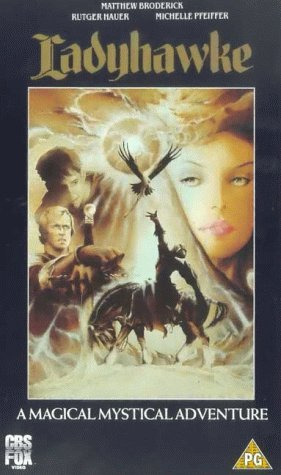
See, the point of all of these things is for one simple reason: to better express the story and characters already present in the script. They are there to accentuate, to enhance, to be good enough to dazzle, but not so good that they overshadow the rest of the movie. It’s a difficult balance, one that can be achieved if the same effort is put into both story and the actual movie-making itself.
The question today is, is that the case for Ladyhawke?
Does Ladyhawke use its storytelling devices well?
Let’s take a look, starting with one of the most important elements in a film: cinematography. (Spoilers below!)
The camerawork in a film can sometimes make or break it. When done well, it is breathtaking, when done competently, it is adequate, but when it’s done badly, it’s really bad. There’s more to camerawork than just pointing it at the action. There’s a lot to consider.
The cinematography, teamed with the editing process, is designed to evoke a reaction out of the audience. A good director knows how to use the camera to emphasize certain details, or overall feelings. The camera is used to help tell the story, while leaving a visual mark on it. Such scenes in Ladyhawke include the stunning shots of the landscapes, giving us wider looks at the expansive world that the characters reside in.

The camerawork in Ladyhawke is, most of the time, good. Not fantastic, but good. Most of the shots are standard uses of the camera to get us to take note of the dress in Navarre’s bag, or the emphasis on his sword. The long takes in the fight sequence in the climax are notably impressive, building a steady rise in tension, as well as showing off the semi-realistic, brutal sword fight.
There are two scenes, however, that surpass ‘good’ camerawork, in my opinion, and become great.

The first occurs semi-early in the film, when the Bishop wakes up in a cold sweat in his bed. He sits up, and we are granted a look at his bed and room: above him, carved into pillars, are birds of prey. Hawks. Given his connection with Isabeau, it’s fitting enough, but then comes another work of brilliant editing. Right after that shot, there is a wider one which reveals something else: carved into the bedpost are wolves, facing away from him. It’s an interesting and effective way to hammer home his connection with the pair before we even know what it is.
The other scene that I’m referring to is a little longer, but is, in my opinion, the best use of camerawork in this entire film.
It comes towards the end of the film, after Navarre (in wolf form) has been rescued from the ice-water and brought back to camp. Isabeau waits with him as dawn nears, signaling both of their transformations. There is an instant, made longer with movie magic, where the two watch each other transform, both fully aware of what is going on. That moment is full of shots of their eyes meeting, and transforming, never actually showing the pair’s bodies change. In another film, this edit would be an excuse to show off the transformation itself, but Ladyhawke doesn’t.

By using the camera effectively, this scene takes on a different emphasis, one of mutual love and grief. This is the scene that fully drives home the couples’ love and separation, and the audience feels it, which, once again, is the point of good filmmaking.
Oddly enough, there are very few ‘special effect’ shots in the film itself. It’s all very down-to-earth, with no outlandish creatures or large set-pieces. For being a film made in the era of big special effects, there’s nothing accomplished in the film that isn’t done with simple camerawork. We never see a transformation in full, we only see before and after, with some clever shots in the middle to give us the idea. While that may seem disappointing, it’s actually very smart to portray the scenes like this: it emphasizes the emotional impact of the sequence, and prevents any ‘dated looking’ special effects in hindsight. It also adds to many of the film’s unique qualities and elements.
There’s more to a film than the camera, however. Let’s talk about the rest of the visuals.
While nowhere near the iconography of The Wizard of Oz, Ladyhawke has its fair share of memorable images, notably Navarre’s black armor and gem-encrusted sword and Isabeau’s mid-air transformation into the titular Ladyhawke.
Part of what makes these images memorable are the distinctive looks of the characters, assisting with the expression of the character. Phillipe’s clothing is scavenged, looking appropriately thrown-together and unremarkable, further demonstrating his scrounging lifestyle and ‘normalness.’ Navarre is dressed in black armor, in a subversion of both the unscrupulous ‘Black Knight’ trope and the upright ‘Knight in Shining Armor’. Neither villainous nor a champion, Navarre is a good man on a quest for revenge, a darker path than most heroic characters in fantasy films. He rides a black horse and carries a unique sword that he plans to use in this revenge quest: once again, completing a memorable image.
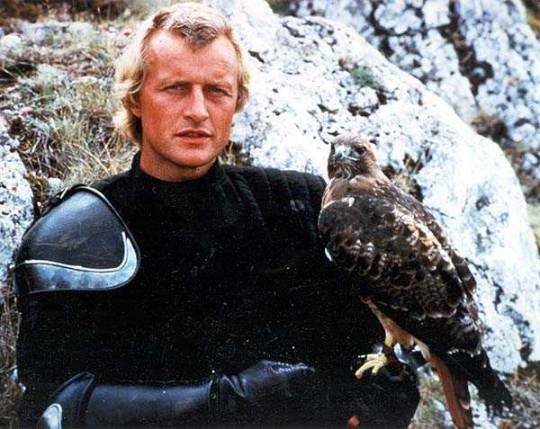
By contrast, there’s Isabeau.
Isabeau doesn’t get armor, but she does get a simple, yet elegant enough, dress, combined with Navarre’s black cloak. This gives her an ethereal vibe that slowly dissipates the more we find out about her, but still retains her sense of otherworldly dignity.
Speaking of otherworldly dignity, let’s discuss the score, which is anything but.
Now, I’ve mentioned this before, but it bears mentioning again: Ladyhawke’s musical score was recorded by Alan Parsons, and the result is a combination of orchestral instrumental and synth music. Does it fit?
…..Sort of?
Once again, the music is a part of the film’s individual identity, for better or worse. Sometimes the music fits, (mostly the instrumental bits) but one of the biggest complaints about the film is, in fact, the soundtrack. Many people’s complaint is that the music is incongruous, and takes them out of the film experience. On the other hand, lots of people agree that it does add to the ‘individuality’ of the film. So which is it?
Honestly, this one is usually personal opinion. Depending on what one is looking for in a fantasy film, people either enjoy the soundtrack or dislike it. Personally? I enjoy it’s differentiation from contemporary fantasy soundtracks, but can understand why some would disagree.
No matter which way you feel about it, you do have to admit that it’s distinctive.
The musical score does rise and fall with the action, playing triumphant fanfares over battle sequences and quieter, introspective music over reflective scenes, and it does do what a soundtrack is supposed to do: get a reaction out of the audience, and help influence the emotion in a scene.
Another one of the odd things about this film is the lack of sets within it.
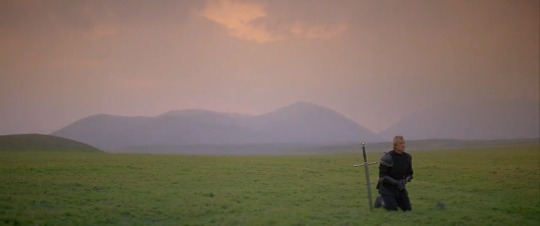
There are sets, obviously. The cathedral, the prison, the barn, etc. are all examples of sets used within the film, but an equally large portion of it is set outside. The film feels very natural in this sense, by using very grounded sets, further adding to the relatively realistic tone of the film as a whole. The scenes in which the actors are performing are very tame, plain, and in a way, more accurate to the period and setting they are actually trying to portray. Unlike many contemporary fantasy films, Ladyhawke feels very real-world in comparison. Being set in medieval Europe, there are no ornate palaces or magical caverns. As a result, every set and landscape feels like it is genuine and solid, adding weight to both the story and the performances that are coming across.
And after all, the performances are arguably the most important element.
No matter the thought or quality put into sets, special effects, costumes, music or cinematography, in the end, it’s on the performances to sell the story and characters. Each individual scene rests on the actors and their ability to compel the audience.
Matthew Broderick’s performance as Phillipe Gaston is charming, managing to pull off a semi-comedic character in fairy-tale circumstances. He’s sly and smart, but out of his comfort zone, rendering him rather helpless at times. He is a character struggling to catch up with events, slowly becoming a part of the story and learning to do the right thing, even at risk to himself. He’s humorous and later compassionate, expressive and outspoken to the other characters, and in his private discussion with God.
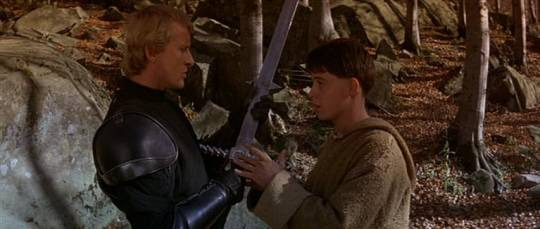
Navarre is almost the opposite, closed off and mysterious. Rutger Hauer’s turn as a good man cursed is very compelling, portraying both the grim determination for revenge, and the broken heart of one half of two star crossed lovers. (Special mention goes to the above scene with the mutual onscreen transformation, appropriately heartrending, and his confrontation at the Bishop at the end.) Hauer also has good chemistry with Broderick, depicting the growing friendship between the two very well. He portrays the full gambit with restraint, giving the impression of emotion bubbling under the surface until his joyful reunion with Isabeau at the end.
Michelle Pfieffer as Isabeau is haunting and heartbreaking, a woman living a half-life, cursed to be with the man she loves, but unable to have a relationship with him. Separated from all she knows, with little choice in her life’s direction, she also becomes friends with Phillipe, revealing the sad, borderline hopeless existence she is forced to live in. (Again, special mention to that transformation scene, and her cold confrontation of the Bishop.) She portrays a woman containing quiet strength, forced to go on and remain solid for both herself and Navarre’s sake in the face of the curse.

John Wood as the Bishop is appropriately disgusting, an old man motivated by jealousy and lust, taking out his anger on the couple. He cannot bear to take rejection from Isabeau, and he remains obsessed with her after the curse that he dredges up. He portrays a man attempting to retain control until the end. Unable to take Isabeau and Navarre’s bond, he attempts to break it, once and for all, leading to his own demise.
Leo McKern’s performance as Imperius is both comedic and remorseful, a man atoning for his past mistakes by trying to help the couple. He contributes dry wit as well as his sincere services, and his connection with Phillipe allows him to help the couple. McKern shares many scenes with members of the cast that perfectly showcase his gravitas that effectively balance out his lighter moments, rounding out our memorable main cast.

Every character in this film is perfectly realized, coming together as a team against a rotten man. There is no good vs. evil in this story, only the power of love over the power of jealousy and obsession. These characters come across as slightly fairy-tale-esque, but slightly twisted in odd ways. The performances are appropriately subtle and reserved, coming across as very genuinely human and understandable to a very genuinely human audience.
The acting, like everything else in this movie, is understated, and very simple. It’s not bright or colorful, or loud, or epic, it is very down-to-earth and modest. It tells a compelling story with compelling people, assisted by the work done to make it (with the exception of the music) a very realistic and grounded story. The performances perfectly match the rest of the movie, subdued, but genuine, and gripping to an invested audience. Every element in this film is tailored to fit a specific mood, moving the plot along without being obvious about it.
Ladyhawke has been called a cult classic, unpopular upon its theater release. It was greeted with mixed acclaim, labeled as ‘inconsistent’, and debated since then as to whether or not this film was actually good or not. Yes, the music can seem a little incompatible with the film, but overall, it comes across as a reasonably consistent, grounded film with a compelling story and characters, and it really works.
Join me next time as we discuss the behind the scenes story of Ladyhawke with a segment titled: Facets of Filmmaking. Don’t forget that my ask box is always open, and I hope to see you in the next article!
youtube
#Ladyhawke#Ladyhawke 1985#1985#80s#Film#Movies#Fantasy#Adventure#PG-13#Rutger Hauer#Michelle Pfeiffer#Matthew Broderick#Leo McKern#John Wood#Richard Donner
2 notes
·
View notes
Text
BF ending pt2
Ending it this way is unnecessary the same way Ash's rape in ep 22 was. Max's good message from the previous ep gets undermined while Ash, who has been slowly healing is again getting abused by another completely one dimensional and useless villain. His character is subjected to an absurd amount of trauma and unbelievably set up to get into such situations repeatedly not for the sake of plot but I don't know...pointless sadism. Or as I speculated before to cement what is going to happen to him in the end. Everything is forgotten, Ash wins for a moment but in the next the whole process repeats. Cumulating constant horrifying events just for the sake of it isn't good writing and not just because it's upsetting, sometimes something else happens- the useless agony forced down our throats too much starts to not ring true, it's so excessively extra to the point that it loses the impact it should have. Ending suffers from the exact same flaw. I don't agree the ending is objectively good even if it's unhappy. The worst thing about it is that due to things I wrote about earlier ending becomes not believable, it becomes more like a cliche soap opera than grim real life like tragedy. In the context of the repeating unrealistic patterns of worse torment that nevertheless have Ash pull himself through like a superman each time the ending loses a feeling of finality and realism within the story. That's why I cannot connect with the popular narrative praising the ending for being near perfectly constructed, logical and realistic even though painful. I can't get behind the reception of it as some kind of edgy masterwork in which the huge part of its greatness lays in its overt grimness.
I think people misunderstand that those who don’t like the ending are against it only because it’s not happy, that we could only accept it if it was a ride into the sunset. The way Ash died was tawdry more than clever and it can’t be glossed over. It wasn’t the only right and the best way at all but there’s another missed opportunity here. The whole journey of Ash was about breaking out of the role he’s been given (going against Dino, refused to side with Foxx). The role of the victim and then the one of a monster. He wanted to do it, was cheered on by Eiji along the way. Plagued by doubts if he could but in any case actively working towards freeing himself. When fans often insist Ash can’t be anything but a murderer, can never even try to live normally, live any other way than as a killing machine destined to die it is sadly the same self-defeating thing Ash does, it’s what he’s been told by the villains who want him to be like that and opposite of what Eiji fights to tell him. The ending means crossing out all previous efforts of Ash trying to struggle against it and all support of Eiji’s, it means it was unsuccessful in the end. All that Eiji tried to tell him, how he is a person and deserves to be just that is being finally undermined. He didn’t free himself, he internalized the reductive, negative image and punished himself, didn’t die freed. Remember the time when Yut Lung tried to guilt trip and victim blame Eiji for being Ash’s destruction? He is told he will be the reason for Ash getting hurt and his eventual death and to leave Ash alone or better yet kill himself if he cares for Ash and doesn’t want for it to happen? Eiji calls out this bullshit and doesn’t listen. Eiji rebelled when he was told to distance himself from Ash for Ash’s sake, while Ash (and the audience) totally buys into this narrative that Ash is only an unnecessary danger in regards to Eiji and needs to be separated or die if he cares. Also in the same scene Eiji still doesn’t accept Ash can’t escape and should be who Yut Lung and Dino think he is supposed to be. We all cheered for Eiji during that part of the story so why when Ash listens to what his enemies say about him, what they want from him people just accept this is what he can’t escape? Eiji never bought into the whole “they can never be together anyway because Destiny” either. They are more than a needless trouble to each other and what they are to each other when they’re together is worth more than the risk because they are simultaneously each other’s salvation too. Ash isn’t the only one who needed the other person, Eiji was depressed and purposeless before he came to America and he understands all that. In turn, Eiji isn’t there only to make Ash feel momentarily good, if he actually listened to Eiji it could help Ash to step outside the monster fate others scripted for him and I think it’s a shame that we have an ending that despite all the earlier declarations makes Eiji’s efforts useless, Ash resigns while ending allows the villain’s narrative to triumph.
One thing I've noticed is that people who like the ending saying they embrace the "necessary tragedy" in the same breath reframe it as positive, packaging it in this cushiony comforting language of liberation and sugary uplifting metaphors. Which ring entirely false if you actually face the reality of his ending. In the end Eiji didn't free Ash, having it this way means Ash bled out because he evidently thought he doesn't deserve anything better, ending means that despite cherishing Eiji's love for him Ash died still believing he's a monster who can't escape his fate. Dies believing he can't even be free. He was comforted by Eiji but it did not change anything because he didn't listen to him. I guess some people avoid confronting themselves with all that choosing instead to sugarcoat in order to reconcile but if you appreciate the harshness and you're vocal that some endings gotta be like that then why frantically reconstructing it as a joyful, epic resolution, making it out to be deep and cathartic event. If you say it's in agreement with story themes/convention then at least be consequential and admit it's bleak instead of repeating how it was actually soooo good for Ash to die. I know the strategically placed letter lends itself to try and dress Ash death in superlatives but the truth is all the happy things it meant happened earlier and have zero to do with Ash death, moreover his bleeding out crosses them out, they serve only to sweeten the morbid and sad thing that is happening. The fact of Ash dying didn't make him happy, free, didn't change his life for the better because it literally finishes it. Death doesn't magically capture all the good things forever while getting rid of the bad. So many can't acknowledge what it means, it's really that simple and awful. It doesn't bring anything good to Ash, it doesn't make him feel good. The letter did but death took everything away, the good along with the bad. So forgive me if I'm not thrilled for him...
It's quite cruel that how everything is purposefully arranged to be so doomed for a long time, then at one moment the whole conflict is resolved to give us false hope just to immediately tear it away and knock it down for good. It is of course done for more drama but it's also what makes the end so unsatisfying and makes us feel cheated out of a resolution. This sort of emotional blackmail and mixed emotions used repeatedly through BF to evoke the biggest possible response has once again unintentionally backfired on itself. BF ending is supposed to be a heartbreaker but only a fraction of that emotion is truly authentic or earned because the entire thing is built only to pain the reader, everything targeted with the eventual tragedy in mind. It’s viciously manipulative almost to an unseemly extent and becoming a shameless morbid tear jerker. I don't think there's a necessary correlation between good affecting fiction and the amount of torture inflicted on the character, I don't think the more it makes you squirm the more effective a work of art is, often on the contrary. And once you go overboard with it things become too artificial, coldly calculated. The story sacrifices consistent plot and character growth for cheap thrills in service of one weepy goal. It uses suffering of the characters and the readers in a very exploitative way, counting on creating an impact in such manner risks the story becoming a torture porn keeping it from having real developed resolution.
35 notes
·
View notes
Link
The Victims
Welcome to April 27 1997, one week before the murder of Lee Miglin, the victim of last week’s episode. With episode four of The Assassination of Gianni Versace, “House By The Lake��, we witness the beginning of Andrew Cunanan’s killing spree. This is where it all started – this is the moment that would eventually bring Cunanan right up to Gianni Versace’s doorstep.
Like last week’s episode, though, Versace is nowhere to be see in “House By The Lake.” Versace’s death was merely the rocket fuel to launch this season of American Crime Story into orbit. Ever since this season began its grim backwards march, it’s been moving further and further away from the overlit world of Miami Beach to show us the deceptive, manipulative reality of Andrew Cunanan.
“House By The Lake” begins in Minneapolis, with Andrew staying at the spacious loft apartment of friend and former lover David Madson. Clearly, something awkward has occurred between these two men right before this episode begins. The air in the room is thick with tension. “We both said some things we regret,” David says, trying to make peace. “I don’t regret anything I said,” Andrew replies, each word deliberate and meticulous as he utters it.
This passive aggressive mood seems almost unbearable, but things get a lot worse, fast. Andrew and David’s friend Jeff Trail soon arrives. He’s come to retrieve a gun Andrew stole from his apartment (big red flag alert). David has to let Jeff into the building, and as the two make their way back to the apartment – where Andrew waits in the shadows – they converse about Andrew the way someone talks about a volatile child. It’s clear they both think they need to handle Andrew with kid gloves. David seems sympathetic; Jeff, not so much.
“He has no one,” David says.
“He should ask himself why,” Jeff shoots back.
Before the opening title card has even appeared, Jeff is dead – brutally bludgeoned to death by Andrew with a hammer. From here, the episode settles into a steady, unrelenting feeling of nameless, inescapable dread. Andrew is able to manipulate David into going on the run with him. But it can’t last. Andrew wants to live in a fantasy where David will love him for who he is – but that’s the problem. Andrew isn’t anyone. He’s a blank slate; a shapeshifter who can be whatever the situation needs him to be. You get the sense throughout “House By The Lake” that Andrew is really trying to make his new arrangement with David work. But it’s impossible. David is Andrew’s emotional (and in some cases, physical) prisoner, and when the realization seeps in that David will never accept him, Andrew kills David too. And then it’s off to Chicago, and towards last week’s murder of Lee Miglin.
No One Else
Unlike previous episodes, “House By The Lake” isn’t ultimately about Andrew. It’s about David, and the tragedy of his all-too-brief life. In various flashbacks, we see David as a younger man with his gruff, outdoorsman father. While out hunting one day as a small boy, David runs from the sight of a dead animal. He’s later ashamed at his perceived weakness, but his father is sympathetic. “I never want you to be sad,” his father tells him.
Later, we see David coming out to his father in an uncomfortable, not entirely hopeful, but ultimately realistic scene. “Mind if I take a moment?” David’s father asks after David confesses he’s gay. “I don’t want to say the wrong thing.”
The father follows this up with, “Maybe you wanted to be told I don’t have a problem with it; I can’t say that, but what I can say is I love you more than I love my own life.” It’s a heartbreaking moment, made all the more heartbreaking later when, as David lays dying, he has a vision of sharing a cup of coffee with his father.
David’s sexuality, and his ultimate fear of disgrace – a fear that was brought up last week as well, but about Lee Miglin – is what colors all of David’s ultimately terrible decisions following Jeff’s murder. A rational, reasonable thing to have done following Andrew’s brutal crime would have been to call the police and report Andrew immediately. But Andrew, so adept at manipulation and exploitation, is able to talk David out of this. And when enough time passes, it’s too late. As Andrew puts it, if David tries to call the cops, the cops will simply believe he was in on the murder with Andrew. “They hate us, David. They’ve always hated us,” Andrew says. “You’re a fag.”
These fears turn out to be ultimately reasonable. Later, when two detectives arrive at the apartment after Jeff’s body is discovered, their first assumption is that the murder is some sort of “gay thing.” They arrive rather quickly at the assumption that David was in some way involved with the murder, and they go so far as to bring that assumption to David’s frightened parents.
The most telling moment of the episode comes when, while on the run, David and Andrew stop at a bar. Andrew is still riding high, seemingly unperturbed that he’s committed a murder and is now a fugitive. In this moment, David excuses himself to the bathroom, where he shatters a window and sees a clear path to escape. The camera lingers on this moment, as we wait for David to do the obvious thing: get the hell out of there.
Andrew, meanwhile, sits in the bar, listening to the soothing sounds of special guest star Aimee Mann crooning a sad, slowed-down cover of The Cars’ “Drive.” Here, in this brief moment, Andrew’s barriers fall away and he begins to weep. Is he weeping because of the music (it’s pretty damn sad), or is he weeping because he knows he’s dug himself into a hole he can never climb out of? Up until he murdered Jeff Trail, Andrew’s crimes were petty – long cons and little (and sometimes big) lies. There’s no going back from murder, however. And in this moment, perhaps Andrew realizes that nothing matters anymore. That if he wants something going forward, he might as well kill to get it.
This moment of reflection is broken when David unexpectedly returns to the table, having decided not to escape. Why? The answer comes later, as the two are on the road again. David confesses he’s thinking about what the police are going to find out about him, and says he realizes he’s been doing this his entire life – thinking about people “finding out” about his sexuality. He wonders how his parents are going to live in their small town “with all that talk.”
“Was I really afraid…that you were going to kill me, or was I afraid of the disgrace?” he asks Andrew. David is stuck. He’s fear of people judging his sexuality has tethered him to Andrew, and it will, tragically, lead to his doom. As Andrew puts it: “The truth is, we have no one else.”
It Was All A Lie
By now, the viewer has likely caught on to the bait and switch American Crime Story: The Assassination of Gianni Versace has pulled. This isn’t a bad thing; in fact, it’s rather ingenious in its construction. The first two episodes lull the viewer into assuming they know exactly what type of season this will be. Episode three, however, hints that things are going to turn out much differently. And now, by episode four, Versace seems to be pulling back the curtain completely. If this were a card game, this episode would be the moment the player who has been brilliantly bluffing you shows you their hand.
Perhaps this is why, ultimately, the season is moving backwards rather than forwards. Andrew Cunanan’s murder of Versace made headlines, but it wasn’t an isolated incident. By moving back in time, we’re getting the whole story, bit by bit. We’re learning the true, terrible nature of Andrew Cunanan.
Director Dan Minahan approaches this episode on two different fronts: one is that ever-mounting tension mentioned earlier. The first half of the episode, set in the nightmare that is David’s apartment, is full of pulse-quickening moments of dread, all of it underscored by an unsettling, ever-present droning sound on the soundtrack. The other front of this episode is the tragic side; the sad life and death of David Madson, who ultimately dies by a river in the middle of nowhere. These heartbreaking elements are the more effective, made all the more so by the performances, particularly Cody Fern as David.
By the episode’s end, David has realized Andrew’s true nature. He recounts the romantic evening he and Andrew once spent years ago, sounding wistful before ultimately ending with a harsh, blunt: “It was all a lie.” “Is that why you killed Jeff?” he asks Andrew. “You loved him…but he figured you out in the end, didn’t he? He finally saw the real you, and you killed him for it.” Fern’s delivery of these lines, with just the right mixture of anger and misery, is pitch-perfect.
As always, Darren Criss’ performance as Andrew remains a highlight, but Andrew has grown more and more despicable and detestable as the season has continued, which ultimately makes spending time with him distasteful. It’s a very tough balancing act, and Criss pulls it off for the most part. But there’s only so much we can take. A shot near the end of Andrew cuddling David’s dead body is particularly blood curdling.
Stray Observations:
– As I’m pretty sure I’ve said multiple times in this review, this is a sad, heartbreaking episode. But there’s some (darkly) funny stuff, too. The way Criss delivers Andrew’s line, “I’m so glad you decided to come with me!” after he’s virtually kidnapped David is bleakly hilarious.
– One subtle but unmissable running motif in the episode: Whenever David and Andrew walk somewhere, Andrew puts his arm over David’s shoulder possessively, like property.
– Finn Wittrock makes a very brief appearance in this episode as Jeff Trail. Next week’s episode, “Don’t Ask Don’t Tell,” will give him center stage. It’s also the best episode of the entire season.
– This week’s pop songs: the aforementioned “Drive” by The Cars (as covered by Aimee Mann), and “Pump up the Jam” by Technotronic.
– Yes, that really was Aimee Mann in the bar. “We talked about who we could get to play this,” producer Brad Simpsontold Vanity Fair. “Somebody who was first known in the 1980s, who had a strong voice and you could buy as somebody who would live in this landscape. When we went to Ryan [Murphy] for suggestions of who could it be, he instantly said, without a beat: ‘Aimee Mann. Send her the pages, tell her we’re gonna figure out the song, but it has to be her.’”
22 notes
·
View notes
Text
the good wife season 6&7 @jod1ewhittak3r
okay so s6 started with the whole cary being in jail plot which was HEARTBREAKING and stressful because I love Cary! I really liked how Alicia, Diane etc. rallied around him and I’m sad things kind of fell apart for that group after that. And like Cary was almost guilty! And then Kalinda DID THE THING to get him free which got her in trouble omg, that was awful s6 was a stressful season. All the Cary/Kalinda feelings because of that though!
Also Finn existed and Finn/Alicia were cute, sadly that didn’t last long! And Johnny! Johnny/Alicia also cute!
Alicia starting running for SA, which awesome! I hope she’s at least governor by now, lol. I loved the episode with the debate that was a good one! And I loved the episode where Alicia had laryngitis and it went inside her head (6x14)! I liked, of course, that Alicia tried not to go negative in her campaign to be different than Peter and do the right thing that was great!
Canning being in the hospital was interesting/fun, he didn’t really change at all even when his health was so bad!
Also the one where Diane went hunting was a lot of fun even though I was so conflicted when she started helping the hardcore Republican cases!
Then EVERYTHING STARTED FALLING APART OUCH. First of all Alicia wins, which I expected. But I didn’t expect her to get kicked out so soon! That was such a bold move by the show! And a little sad, I’d have liked to see a powerful female politician! Alicia didn’t go back to LA because of a misunderstanding and then KALINDA left ouch all those last scenes with Kalinda, Alicia and Cary HURT. And Finn leaves too! And Johnny left already! Rude! I thought it was a pretty good ending for Kalinda though, it showed how much she loved Alicia (and Cary but maybe not as much lol), and how much she’s willing to sacrifice and also how she usually doesn’t like connection but made some here.
So S7, I LOVED Alicia working at the bond court! She kept stealing their cases, which kind of showed that she really values ambition, but also helping people, over pleasing people, or making friends. But she met Lucca. I love Lucca and Florrick&Lucca was great!
ALSO JASON! JASON omg I have a crush on him, obviously (why does he look nicer in this then everything else) and I loved his whole relationship with Alicia and them working things out! The one where her mom and brother meet Jason NICE. I don’t know just his mysterious past and his smarts at investigating and his love for Alicia NICE.
Again, Diane had the thing arguing cases she didn’t agree with, which I had a bit of trouble sympathizing which because I didn’t agree with them either!
Grace helping Florrick&Lucca was great!
THEN THE PAINFUL THING BETWEEN ELI AND ALICIA RE: WILLICIA OUCH. I mean she did forgive him, but I feel like it wasn’t clear if that was just because Marissa begged her to or she really forgave him. I mean WILLICIA still got together post-voicemail, so Eli didn’t really mess up their relationship in any lasting way right? Oh well I hope them made up. I hope Eli’s happy he always tries his best and, like a lot of the characters in the show, he has trouble with people, haha.
Eventually Peter lost (yay, Ruth was an interesting character though!) and Jason, Lucca, Alicia joined the big firm again (I don’t even know what it was called at this point!) Which fine but then Alicia/Diane started working against Cary, which I hated. I just really wanted them all to be friends. More on that later.
Let’s see side things: Elsbeth continued to be great, the NSA eps were fun.
The final trial was well done, I’m happy Peter’s guilty. Interesting to see that Zach moved away and Grace stayed maybe a parallel to Alicia.
I just...it was a grim ending for me. It sort of was meant to parallel the premiere I guess in that Alicia was alone. Jason didn’t pick up. She alienated Diane. She’d already alienated Cary. I guess she still has Lucca but she kind of messed up Lucca’s career by making her argue against Diane. Also I have trouble believing she’ll be loyal to Lucca for that long given how she treated Cary (kicking him out of the firm, after they seemed to be BFFs). She’s divorcing Peter. Zach’s in France. She’s just pretty alone. I don’t know I’d rather have had a cheesy ending where Eli, Cary, Elsbeth, Diane, Alicia, Geneva, Matan all worked together to bring down Peter and celebrated with a party at Lockhart, whatever else it’s named now. Of course, I get it that’s not as realistic BUT I LIKE MY SHOWS HAPPY OKAY!
Still enjoyed the ending it was interesting to see how Alicia reacted to Peter’s new scandal differently (but also similarly) after all these years. I hope we’ll find out more about what Alicia’s up to now in The Good Fight.
0 notes
Text
Goblin: The Lonely and Great God- Episodes 11-13 Recap: Embrace the Emotions
Logan: Hello, Chingus! The end of Goblin is unfortunately near, but before the series end take some time to catch up on Episodes 11-13 with June, Tiara, and I and talk tears, laughter, and everything in between. We’ll be wrapping up Goblin and then as you may have seen we’ll be coming to you with our next project very soon- A new take on Drama Clubs by Reliving the Drama of Boys over Flowers. We’re very excited and we’ll hope you’ll rewatch it with us and see if it holds up to time. But without further ado, let’s talk Goblin.
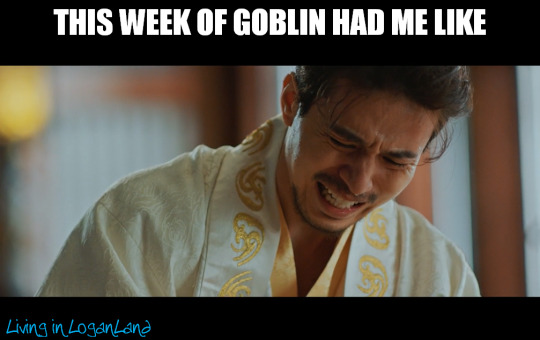
Logan: So Goblin may have started some of us on a complete mental and emotional breakdown this week. But before we get into the super intensely sad moments, let’s not forget we had some touching moments as well. Everyone’s memories are coming back of their past lives starting with Sunny to the Grim Reaper to the other, less evil than Joong Heon, but still evil reaper. It was shocking for us to learn some of the stuff we did these last couple of weeks so it must have been even more shocking for our poor characters.
Tiara: For sure. Sunny has to be thinking, before her memories returned, everyone is super crazy. But I guess evening with her past memories it can’t be easy to accept and not get things mixed up. I loved Shin bring Sunny all her favorites, a little outdated, but it’s the thought that counts right?
June: A complete mental and emotional breakdown is an understatement. I feel like I have to mentally prepare myself every week when I watch this drama, especially lately. The little part with him bringing her favorites was adorable.
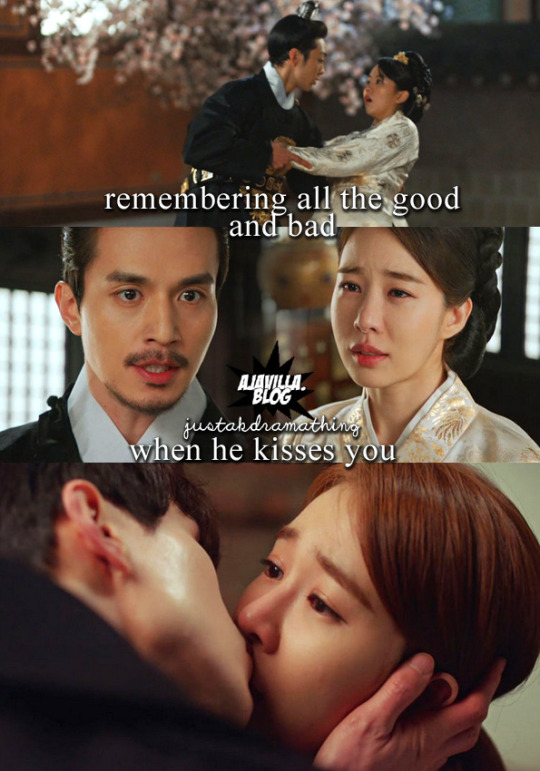
Logan: I was surprised that he did that. After he talked about how she wouldn’t remember, he seemed surprised that she actually couldn’t. He probably just hoped so much that she would be an exception. Luckily, thanks to the Grim Reaper’s sexy kiss she did get her memories back. Well, not so lucky for her I guess. But hey, not a bad way to get a flashback, huh? I might be willing to relive some of my bad memories if I got to kiss Lee Dong Wook in the process.
Tiara: Logan, I think we all would volunteer no matter the type of kiss ^-* The magic of kissing in dramaland. If only the two participants would do more than just press lips together because I know Lee Dong Wook can kiss. Moving on when Shin and Sunny did get their reunion, I just wished these two could have a second chance at being brother and sister. My heart strings are just being pulled and I swear I need to stock up on tissues before this coming week.
June: Haha wouldn’t we all want to be able to kiss Lee Dong Wook! It’s like a K-drama fan’s dream. I agree with you Tiara! I wish we would see more of the siblings interact and have a second chance. I mean there has to be a reason why they were reunited again and really I just want to see them bond again.

Logan: Haha. I mean, it’s true. Lee Dong Wook’s charms are irresistible. I can’t imagine this drama without him. It would be really nice to see a nice heart to heart with Shin and Sunny and for them to have some time to bond and just hang out again. I completely agree, Tiara. As sad as this week’s episode yet, I have this ominous feeling that we’ve just seen the tip of the devastation iceberg. I mean, we’re only on Episode 13. A lot of bad stuff could still happen.
Tiara: NNNNNNNNNNNNOOOOOOO!!! Can’t I go without one week of crying? It can be a happy moment and I end up with tears. Grandma Sam Shin coming to Eun Tak’s graduation day was a surprise but a perfect choice. Granny worked hard to make sure Eun Tak could live and to be there in place of her mom. See tears … However, I loved the moment when Granny told Eun Tak’s teacher she could have been a better teacher. One thing about this drama is people get some pretty good punishment for the wrongs they have done.
June: Honestly, after watching all these episodes, it’s like every moment “I’m like TT, Just like TT”. Ha I just had to throw that in there but seriously, I’ve been so emotional watching this drama! I love Red Granny, I just have to say, especially because she was really always there for Eun Tak.
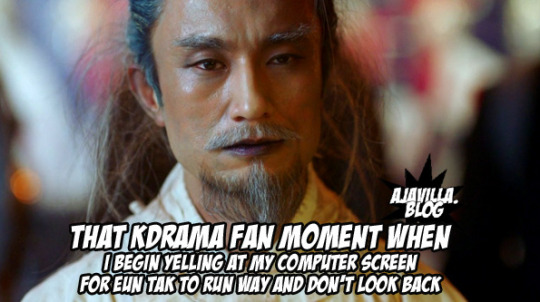
Logan: Haha, that’s the perfect catchphrase, June. Oh my gosh, I forgot that we haven’t talking about Red Granny showing up at Eun Tak’s graduation. Ugh, that was the scene in this drama that really had me sobbing more than anything else so far- but they were happy tears. Whatever type of deity/god Red Granny is, she really cares about her humans and it’s truly touching. One spirit that showed up that was not quite so caring was Joong Heon. I glazed over it before but I was actually frightened when he showed up. I wanted to leave the room he was so creepy.
Tiara: Granny is Sam Shin - the goddess of birth and fate. This is why she calls everyone her children or speaks about creating them. Eunuch Park showing up was a nice plot twist, but dude why isn’t Eun Tak running or blowing out fire whenever he is around? He doesn’t look right nor is he like Casper the friendly ghost. Really where’s the ghostbusters when you need them because evening Shin was having some issues figuring out how to stop Eunuch Park.
June: LOL CASPER THE FRIENDLY GHOST. For real though, if that ghost popped up in my life, I would be lighting something on fire in a heartbeat.
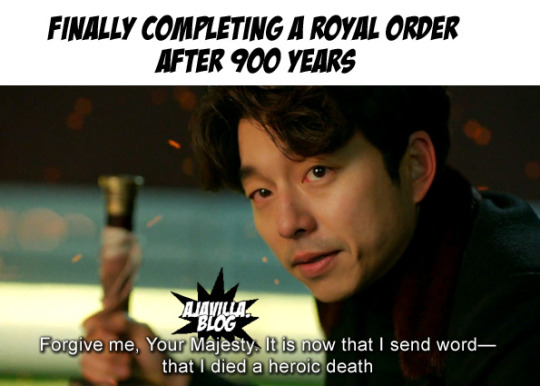
Logan: Yeah, he is bad news. Just the fact that his fingers and lips and tongue are all purple-that’s not a good sign. Him showing up was an omen for evil coming after our beloved characters. Good news, he’s gone but the cost was harsh. It was interesting how both Shin and Eun Tak both fought to be the one to sacrifice themselves. In the end Shin played a little dirty by manipulating Eun Tak’s hands after she passed out, but he probably did the right thing. He knew it was supposed to be him.
Tiara: I am glad Shin was the one to chose to pull the sword. Since everything started with the sword, it’s not surprising it will be the thing to defeat Eunuch Park. Shin was finally able to kill the evil for his King. Bonus, how awesome was it to see Grim Reaper just shout out Park Joong Heon’s name to save Eun Tak. Shin finally got to announce to Wang Yeo his warrior had finally died his heroic death. Dude … the tears on Grim Reaper just about killed me. More so since Wang Yeo thought he died without anyone loving him, but he learns the bitter truth he was truly loved by his brother, his wife, and his brother-in-law. If only that young King couldn’t have been so blinded, he could see the ones who loved him.
June: Man that was so hard to watch. It was like he was finally realizing something he should have all those year ago. But I agree having Shin finally kill that evil man was so satisfying.
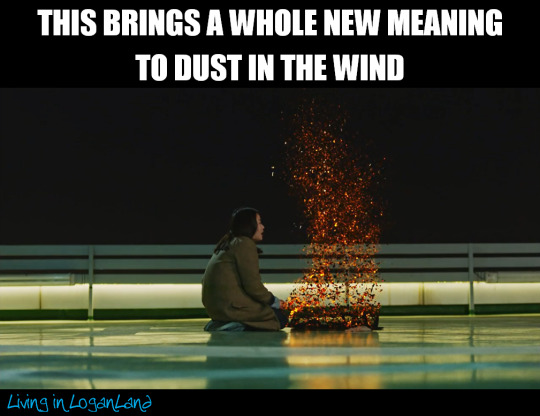
Logan: Heartbreak aside, everything about that final scene was EPIC. Well, I suppose even the heartbreak was epic too. Grim Reaper was so intense when he called Joong Heon out and Shin was equally intense. But the cherry on top of this Epicness sundae was Eun Tak’s reaction. Kim Go Eun impressed me so much with her acting. It almost felt like the actor himself had died in real life, her reaction was so realistic. Then as the perfect finale his body turns to embers and floats away into the wind. I mean, WOW! It was insane.
Tiara: It was a pretty scene once I was able to see it through my tears. Theme of this post is definitely tears … anyhoo it’s a fitting end for our Goblin, but does leave us without a Goblin and three more episodes. I do believe our Butterfly God might be making an appearance again. I do wonder if he plans on possessing Deok Hwa’s body again to deliver another cryptic message or just allow everyone to suffer.
June: Tears everywhere to be honest. But I agree, we still have some episodes left and it’s like where are they going to take this now. I know for some reason, this won’t be the last of him.
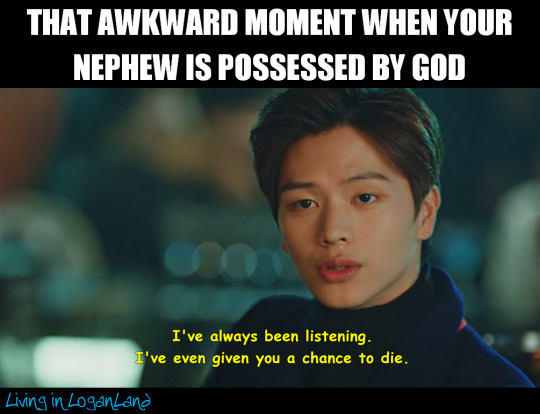
Logan: That was pretty crazy how he had been possessing Deok Hwa this whole time. Kudos to you all who caught onto his extra worldliness. I was relieved to see that he was only possessing Deok Hwa thought rather than had been him all along because I didn’t want to lose Deok Hwa. I liked what Butterfly God said about them making their own choices and him getting kind of annoyed that they blame him for everything yet they make so many bad decisions.
Tiara: The answers are for them to find out while God asks the questions. I’m sorry but it’s still cryptic. Throw us a bone for crying out loud. Deok Hwa has grown up a lot in these few episodes. With Grandpa’s death, he’s finally learned the reality of being the a brother, father, and grandfather to Shin and is able to accept the position. Speaking of hints, Grandpa’s letter to President Kim (formerly Secretary) about giving all of Grandpa’s possession to a man name Kim Shin. Doesn’t this mean the CEO Eun Tak is going to meet in the future is him?
June: I feel like that’s the direction it is for sure heading.
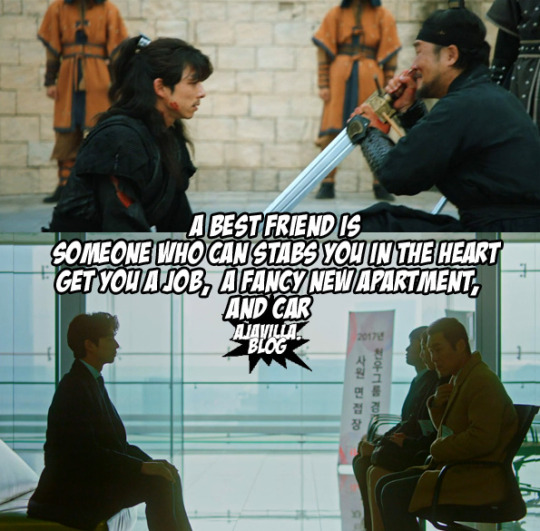
Logan: It seems pretty certain that the Goblin is the man Eun Tak is going to meet in Canada, but I didn’t think much about the will. I just assumed the Chairman wrote it either before or not knowing the Goblin had told President Kim about himself. But now that you point it out it, it makes sense. As I’ve said before nothing is a coincidence in Dramaland. Red Granny also hinted that good things were going to come to Deok Hwa. That makes me happy. He’s a really sweet soul and I want to see good things come to him.
Tiara: Speaking of sweet souls, Shin coming across an applicant for a Kim Woo Shik who just happens to be his Second-in Command. You know the man who vowed to follow Shin in death after stabbing Shin with the sword. I loved with President Kim told Woo Shik why he was giving him a job, a house, a car, and a name for his unborn son was because he saved a nation in a past life. It’s a phase dramaland loves to use, but darn it got me right in the feels. I kind of wanted more with his bestie from the past.
June: Me too!! I wish we had more of that in the drama!
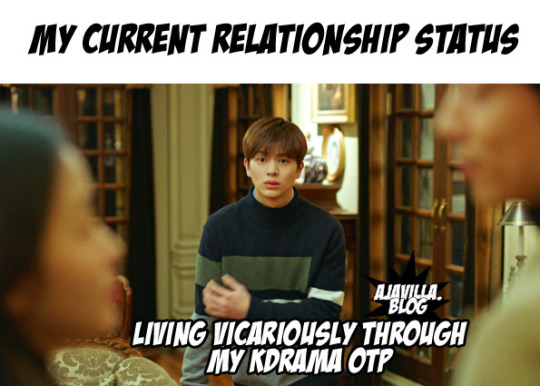
Logan: It’s totally an appropriate time to use the phrase, Tiara. So many happy feels. That���s the one thing- I think I’ve cried more happy tears in this drama altogether than I have sad ones. I mean Shin’s death was obviously hard, but there have been so many smaller, heart-warming moments that add up to a lot of warm and fuzzies for me.
Tiara: You’re right, Logan. Evening in our darkest hour, this drama can still make me laugh and then cry a few minutes later. Good and sad tears of course. I do wonder what will become of the Grim Reaper since he’s gotten in trouble for using his gifts. Considering the powers that be punished him with Wang Yeo’s memories, will he be given a second chance like possibility Shin. Or will he be forever punished to walk the earth ushering souls to Heaven or rebirth? Fingers cross for a second chance. I think Sunny and Yeo should be able to love without politics getting in the way. Heck, I just want them to be able to go on a date before breaking up.
Logan: They’ve already broken up so many times, that so help me if the writer/producers bring them back together only to break them up one more time I’m going to write them a very strongly worded letters with some very unladylike language. Sunny and Yeo need to get married and have babies. I don’t even care if they’re little half grim reaper babies who go around collecting people’s souls. As long as they’re together. Lol.
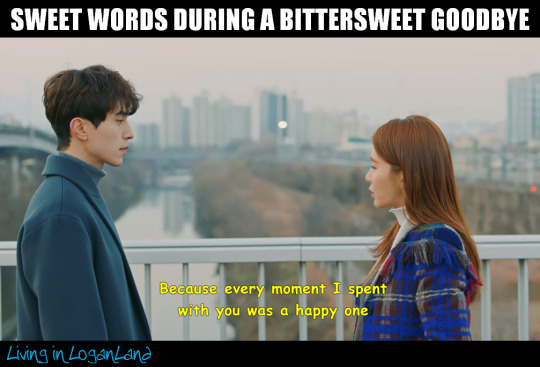
Logan: I hope everyone’s geared up for an emotional last few episodes. Have you box of tissues ready, I know I will. Thanks for joining us and we’ll see you again soon!
______________________________________________
For more from Chingus in Dramaland or to become a KDrama stalker and follow us:
Tiara: Aja-Villa.tumblr | Aja-Villa.blog | Instagram | Twitter | Past Dramafever Drama Clubs |
Logan: Blog | Instagram| Tumblr |
June: Blog | Twitter | Instagram | Tumblr |
#chingus in dramaland#living in loganland#ajavilla#the june guide#Goblin: The Lonely and Great God#goblin#kdrama#korean drama#kdrama meme
3 notes
·
View notes